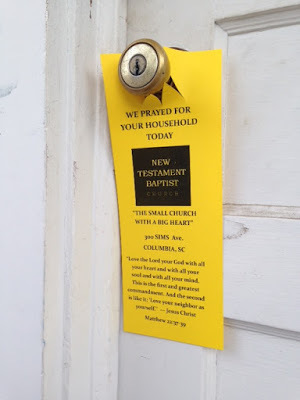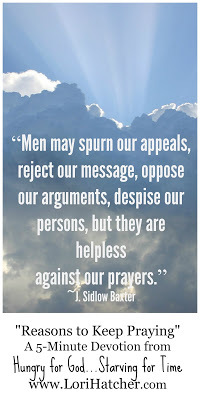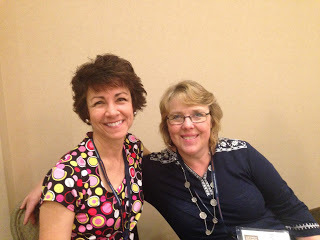Lori Hatcher's Blog: Refresh Blog, page 72
April 4, 2016
11 Surprising Symptoms of Sin Sickness
 “Being convicted by the Holy Spirit is like being nibbled to death by a duck.”
“Being convicted by the Holy Spirit is like being nibbled to death by a duck.” I’m not sure who penned this powerful quote, but it’s one example of how the Holy Spirit works in our hearts to deliver us from sin. Conviction of sin isn’t a popular topic for a blog post, but this spiritual phenomenon is oddly comforting. Feeling uncomfortable when we sin is evidence that the Holy Spirit lives inside us—and that’s grounds for celebration.
Before I was a Christian, I could sin and it didn’t bother me. I’d feel an occasional pang of regret, usually when I got caught, but for the most part, I enjoyed my sin. After all, if sin wasn’t fun, why would anyone do it?
Sometimes I’d feel guilty. Other times I’d wish I hadn’t done it, usually when I experienced the negative consequences of my wrong choices. My conscience might sound a weak alarm when I stepped precariously close to a danger zone, but I could usually rationalize it away.
When I surrendered my life to Christ, however, I gained a powerful ally—the Holy Spirit. In ways I can’t explain, this third person of the Godhead went to work in my life. Like Molly Maids the day before my in-laws came to visit, the Holy Spirit went to work cleaning my spiritual house.
The first thing the Holy Spirit pointed out was the music I listened to. Those words glorify extra-marital sex, drugs, and drinking. Do you really want to fill your ears with that? Then He pointed out my skimpy bathing suit. And some of the books on my bedside table. And the TV show I loved to watch every Friday night.
That first sweep through my spiritual house as a new believer was a deep clean. He got rid of a lot of the big uglies. In the years since, he’s continued to point out areas of my life that are contrary to his best for me.
Anger? Doesn’t accomplish God’s purposes. Fear? Cannot coexist with faith. Apathy? Lukewarm is nauseating. Selfishness? Consider others as better than yourself.
What I find especially interesting is how, when I dig in my heels in rebellion and am unwilling to change, I only hurt myself. The very things I cling to are the same things that make my life miserable.
King David experienced this as well, and describes how awful we feel when we are disobedient to the Lord. He lists 11 symptoms of sin sickness in Psalm 38:
 1. The sharp conviction of sin. “Your arrows pierce me deeply” (v. 1).
1. The sharp conviction of sin. “Your arrows pierce me deeply” (v. 1). 2. A feeling of profound heaviness. “Your hand presses me down” (v. 1).
3. Physical weakness. “There is no soundness in my flesh”(v. 3, 7). “I am feeble and severely broken” (v. 8).
4. Sickness. “. . . nor health in my bones” (v. 3).
5. The feeling of carrying a heavy load. “My iniquities . . . like a heavy burden, they are too heavy for me” (v. 4)
6. Physical and spiritual injuries, possibly the consequences of sinful choices. “My wounds are foul and festering” (v. 5).
7. A disturbed spirit. “I am troubled” (v. 6).
8. A defeated heart. “I am bowed down greatly” (v. 6).
9. Deep sorrow. “I go mourning all the day long” (v. 6).
10. Gastric distress. “My loins are full of inflammation” (v. 7).
11. Inner turmoil. “I groan because of the turmoil of my heart” (v. 8).
This list is a sobering wake up call to the fact that sinful rebellion carries more consequences than just the results of our actual sin. I’ve experienced many of these symptoms when I’ve chosen to ignore the voice of the Holy Spirit when He points out an area of sin in my life.
When I stubbornly hang on to my pet vice, I'm miserable. I have difficulty praying, because I know my sin stands between me and God. I avoid reading my Bible, because God’s Word continues to call me to repentance. I feel anxious, fearful, and guilty. I’m less likely to talk about spiritual things with others, because I know it would be hypocritical. And my sleep is disturbed.
Why, oh why, do we resist the Holy Spirit when all he’s trying to do is make us more like Christ? The more Christ-like we become, the more we’ll experience joy, peace, patience, satisfaction, and spiritual fruit. It’s a win/win scenario. He cleans the junk out of our lives and replaces it with treasures.
If you’re experiencing some of the symptoms I’ve listed above, maybe it’s time to examine yourself to see if there’s sin in your life. If there is, confess it quickly and accept God’s generous offer of forgiveness and restoration.
“If we confess our sins, he is faithful and just to forgive us our sins, and to cleanse us from all unrighteousness” (1 John 1:9).
Then, once you’ve confessed and forsaken your sin, allow the same power that raised Christ Jesus from the dead to transform your life (Rom. 8:11-13).
Relief is only a prayer away.
If you enjoyed this post, why not subscribe? I'll send you twice-weekly 5-minute devotions to help nourish your soul.
Because women need to connect with God in the craziness of life.
Enter your email address and VALIDATE the Feedburner email sent to your inbox.
Delivered by FeedBurner
If this post was meaningful to you, would you consider sharing it with a friend by clicking on one of the buttons below? Did you know you can receive bi-weekly Hungry for God posts sent directly to your email inbox? Visit http://www.lori-benotweary.blogspot.com and click on the link in the right hand corner to Subscribe Via Email.
Copyright 2012 by Lori Hatcher
Published on April 04, 2016 01:58
March 31, 2016
"Pray that All Republicans Will Vanish from the Earth"
Pray that all Republicans will vanish from the face of the earth.
Yup, that’s what the prayer request slip said. Someone slipped it into the prayer box hanging near our church door. Written in bold black marker, it was the first request we’d received since we began our neighborhood prayer initiative.
Our church believes one of the greatest gifts we can give people is to pray for them. During the six weeks leading up to Easter we’d been blanketing the neighborhood in prayer. Every Saturday morning we’d walk a different street and stop at each house to pray silently for its occupants. Then we’d leave a doorknocker saying, “We prayed for your household today.”
 On our Facebook page one man left a comment that said, “Pray that narrow-minded bigots will accept gay marriage.” Another, in response to the doorknocker left at his house, said, “Great, just what I need, another piece of trash to clog up the landfill.” (I wonder if this man also leaves negative comments on Domino’s page in response to the discount pizza coupons they often leave in paper boxes.)
On our Facebook page one man left a comment that said, “Pray that narrow-minded bigots will accept gay marriage.” Another, in response to the doorknocker left at his house, said, “Great, just what I need, another piece of trash to clog up the landfill.” (I wonder if this man also leaves negative comments on Domino’s page in response to the discount pizza coupons they often leave in paper boxes.)
Comments like these sometimes catch us by surprise. Our intent is to bless people, so when they react negatively, or with hostility or rudeness, we’re taken aback. We know how precious the gift of prayer is and find it hard to imagine why someone would reject such an offer.
God’s Word has an explanation:
“For the message of the cross is foolishness to those who are perishing, but to us who are being saved it is the power of God” (1 Cor. 1:18).
Praying to a God you cannot see? Foolishness!
Asking him to do something on someone else’s behalf? Foolishness!
Spending beautiful spring mornings tromping around a neighborhood praying for people you don’t even know? Foolishness!
Responding with gentleness and respect to those who mock you? Foolishness!
“But God chose the foolish things of the world to shame the wise; God chose the weak things of the world to shame the strong” (1 Cor. 1:27).
And so we keep on praying.
We pray for the one who wrote, “Thank you so much for doing this. Please pray for my sister, who’s going through chemotherapy.”
We pray for the one who wrote, “Please pray for my mom. She’s having medical tests this week.”
We pray for the one who wants Republicans to vanish from the earth.
And for the one who thinks an offer of prayer is something you throw away.
We ask God to open their hearts to believe, and we believe he will do it.
 “The prayer of a righteous man is powerful and effective” (Jas. 5:16).
“The prayer of a righteous man is powerful and effective” (Jas. 5:16).
Are you praying for someone who’s rejecting you? Don’t stop. God promises—you will reap a harvest if you don’t give up (Gal. 6:9).
“Men may spurn our appeals, reject our message, oppose our arguments, despise our persons, but they are helpless against our prayers.” ~J. Sidlow Baxter
 Stepping Out! How Our Footwear Impacts Our Faith
Stepping Out! How Our Footwear Impacts Our Faith
If you're in the Lexington, South Carolina area, I'd love for you to join me at Riverbend Community Church, 1015 Corley Mill Road, on Saturday, April 16 from 10-12:30 for their Annual Spring Luncheon. Cost is $5 and includes food, fun, and fellowship.
Slip on your favorite shoes, grab a friend, and come on!
Reserve your spot by calling the church office at (803)356-8596.
If you enjoyed this post, why not subscribe? I'll send you twice-weekly 5-minute devotions to help nourish your soul.
Because women need to connect with God in the craziness of life.
Enter your email address and VALIDATE the Feedburner email sent to your inbox.
Delivered by FeedBurner
If this post was meaningful to you, would you consider sharing it with a friend by clicking on one of the buttons below? Did you know you can receive bi-weekly Hungry for God posts sent directly to your email inbox? Visit http://www.lori-benotweary.blogspot.com and click on the link in the right hand corner to Subscribe Via Email.
Copyright 2012 by Lori Hatcher
Yup, that’s what the prayer request slip said. Someone slipped it into the prayer box hanging near our church door. Written in bold black marker, it was the first request we’d received since we began our neighborhood prayer initiative.
Our church believes one of the greatest gifts we can give people is to pray for them. During the six weeks leading up to Easter we’d been blanketing the neighborhood in prayer. Every Saturday morning we’d walk a different street and stop at each house to pray silently for its occupants. Then we’d leave a doorknocker saying, “We prayed for your household today.”
 On our Facebook page one man left a comment that said, “Pray that narrow-minded bigots will accept gay marriage.” Another, in response to the doorknocker left at his house, said, “Great, just what I need, another piece of trash to clog up the landfill.” (I wonder if this man also leaves negative comments on Domino’s page in response to the discount pizza coupons they often leave in paper boxes.)
On our Facebook page one man left a comment that said, “Pray that narrow-minded bigots will accept gay marriage.” Another, in response to the doorknocker left at his house, said, “Great, just what I need, another piece of trash to clog up the landfill.” (I wonder if this man also leaves negative comments on Domino’s page in response to the discount pizza coupons they often leave in paper boxes.) Comments like these sometimes catch us by surprise. Our intent is to bless people, so when they react negatively, or with hostility or rudeness, we’re taken aback. We know how precious the gift of prayer is and find it hard to imagine why someone would reject such an offer.
God’s Word has an explanation:
“For the message of the cross is foolishness to those who are perishing, but to us who are being saved it is the power of God” (1 Cor. 1:18).
Praying to a God you cannot see? Foolishness!
Asking him to do something on someone else’s behalf? Foolishness!
Spending beautiful spring mornings tromping around a neighborhood praying for people you don’t even know? Foolishness!
Responding with gentleness and respect to those who mock you? Foolishness!
“But God chose the foolish things of the world to shame the wise; God chose the weak things of the world to shame the strong” (1 Cor. 1:27).
And so we keep on praying.
We pray for the one who wrote, “Thank you so much for doing this. Please pray for my sister, who’s going through chemotherapy.”
We pray for the one who wrote, “Please pray for my mom. She’s having medical tests this week.”
We pray for the one who wants Republicans to vanish from the earth.
And for the one who thinks an offer of prayer is something you throw away.
We ask God to open their hearts to believe, and we believe he will do it.
 “The prayer of a righteous man is powerful and effective” (Jas. 5:16).
“The prayer of a righteous man is powerful and effective” (Jas. 5:16). Are you praying for someone who’s rejecting you? Don’t stop. God promises—you will reap a harvest if you don’t give up (Gal. 6:9).
“Men may spurn our appeals, reject our message, oppose our arguments, despise our persons, but they are helpless against our prayers.” ~J. Sidlow Baxter
 Stepping Out! How Our Footwear Impacts Our Faith
Stepping Out! How Our Footwear Impacts Our FaithIf you're in the Lexington, South Carolina area, I'd love for you to join me at Riverbend Community Church, 1015 Corley Mill Road, on Saturday, April 16 from 10-12:30 for their Annual Spring Luncheon. Cost is $5 and includes food, fun, and fellowship.
Slip on your favorite shoes, grab a friend, and come on!
Reserve your spot by calling the church office at (803)356-8596.
If you enjoyed this post, why not subscribe? I'll send you twice-weekly 5-minute devotions to help nourish your soul.
Because women need to connect with God in the craziness of life.
Enter your email address and VALIDATE the Feedburner email sent to your inbox.
Delivered by FeedBurner
If this post was meaningful to you, would you consider sharing it with a friend by clicking on one of the buttons below? Did you know you can receive bi-weekly Hungry for God posts sent directly to your email inbox? Visit http://www.lori-benotweary.blogspot.com and click on the link in the right hand corner to Subscribe Via Email.
Copyright 2012 by Lori Hatcher
Published on March 31, 2016 01:58
March 28, 2016
What Makes You Afraid? How to Conquer Fear
 I could make a very long list if I jumped on that train. I started to list what frightens me most, but it was too scary. Seriously. My goal today is to help you conquer fear, not give in to it.
I could make a very long list if I jumped on that train. I started to list what frightens me most, but it was too scary. Seriously. My goal today is to help you conquer fear, not give in to it. So let’s acknowledge, in a general sense, that there are aspects of this world that frighten the daylights out of us. Fear is a natural response. We become afraid when someone or something we care about is threatened.
You need to know two things about fear:
1. Fear, unbridled, can make us powerless.
2. Fear, channeled, can make us powerful. God gave fear to protect us.
Healthy fear is good and necessary. We fear death, so we don’t jump off mountains, drive recklessly, or pick fights with gang members. We fear disease, so we exercise regularly, take vitamins, and use sunscreen. We fear financial ruin, so we save regularly, work diligently, and invest wisely.
 Unbridled fear, however, can become a vicious captor. It locks us in a prison of our own vulnerabilities and throws away the key. It steals the sunshine from our days and the sleep from our nights. Fear knows we are most vulnerable when the house is quiet and the world is dark, so it waits beside our bed to whisper custom-designed what ifs into our trembling ears.
Unbridled fear, however, can become a vicious captor. It locks us in a prison of our own vulnerabilities and throws away the key. It steals the sunshine from our days and the sleep from our nights. Fear knows we are most vulnerable when the house is quiet and the world is dark, so it waits beside our bed to whisper custom-designed what ifs into our trembling ears. But while God has given us the ability to feel fear, he hasn’t given us a spirit of fear. Every good and perfect gift comes down from the Father, and unbridled fear is not a good and perfect gift. Unrestrained, it renders us powerless, but channeled, it can make us powerful.
How?
It depends on what we do with it. Like the warning bells at a railroad crossing, fear can alert us to danger so we can take appropriate action to protect ourselves and those we love. It can also point out areas of vulnerability or concern so we can claim God’s promises and pray diligently.
Here’s an example:
One day Fear points out the statistic that 50 percent of marriages end in divorce. This scary fact causes me to think about six of my closest friends and their husbands. Fifty percent? That means three of my friends’ marriages could break up. Then Fear flashes another statistic in front of my eyes—that the second highest rate of divorce occurs during the empty nest years. Yikes! That’s where we all are. Now I’m really afraid. I’m convinced that three of the six couples I care about are doomed. Which ones will it be?
Because Fear loves a crowd, it motivates me to share my findings with my friends. They start thinking about their husbands’ cute secretaries, the long hours they spend on their computers, or the way they’ve been quiet and preoccupied lately. By the time Fear has clocked out for the day, it’s disturbed and distressed four women. Since its quota was only one, its bonus check will be rolling in soon.
But we don’t have to jump on the fear train. There is a better way.
“Perfect love casts out fear” (1 John 4:18). Fear and love cannot coexist. Because God is love, and, if we’re believers, God lives within us, his love can neutralize the fearful darts of the enemy.
Here’s an example:
One day Fear points out the statistic that 50 percent of marriages end in divorce. That scary fact causes me to think about my six closest friends and their husbands. Fifty percent? That means three of my friends’ marriages could break up. Then Fear waves another statistic under my nose—the second highest rate of divorce occurs during the empty nest years. Yikes! That’s where we all are. Now I’m really afraid.
But God’s Spirit, whose voice is more powerful than the spirit of fear, takes control. He reminds me of the couples’ Bible study I read about online. What if you invite your friends to meet once a week for a marriage Bible study? He whispers in my ear. I share the idea with my husband, who suggests that we invite another couple to co-lead the study with us. We pray about it, then propose the idea to our friends. They enthusiastically embrace it, and we begin our study.
Four years later, we’re still meeting together to study, support, and pray for our marriages—and all six couples are still married.
The next time Fear whispers (or shouts) in your ear, I suggest you take these steps:
1. Hold up your fear to the truth of Scripture (2 Cor. 10:5). Ask, is this fear legitimate?
2. If yes, pray about it. Place the burden on God’s broad shoulders, and leave it there.
3. Search the Scriptures. Is there a promise you can claim, a principle you can apply, or an example you can learn from? I guaranteed there is. God’s Word is applicable to all situations.
4. Ask God to show you if there’s any action you should take. If yes, do it.
5. Believe that God can and will work in your situation.
6. Every time Fear whispers in your ear, silence his voice with the Word of God and prayer.
Repeat steps 1-6 as often as needed until you banish Fear and win the victory.
Now it’s your turn. What are you afraid of? Don’t let Fear make you powerless. Instead, let it make you powerful.
“Finally, be strong in the Lord and in his mighty power. Put on the full armor of God so that you can take your stand against the devil's schemes. For our struggle is not against flesh and blood, but against the rulers, against the authorities, against the powers of this dark world and against the spiritual forces of evil in the heavenly realms. Therefore put on the full armor of God, so that when the day of evil comes, you may be able to stand your ground, and after you have done everything, to stand” (Eph. 6:10).
If you enjoyed this post, why not subscribe? I'll send you twice-weekly 5-minute devotions to help nourish your soul.
Because women need to connect with God in the craziness of life.
Enter your email address and VALIDATE the Feedburner email sent to your inbox.
Delivered by FeedBurner
If this post was meaningful to you, would you consider sharing it with a friend by clicking on one of the buttons below? Did you know you can receive bi-weekly Hungry for God posts sent directly to your email inbox? Visit http://www.lori-benotweary.blogspot.com and click on the link in the right hand corner to Subscribe Via Email.
Copyright 2012 by Lori Hatcher
Published on March 28, 2016 01:58
March 24, 2016
The Faith Life -- When It Isn't What You Signed Up For
“What do you think happened to Peter?” I asked my pastor/husband.
I’d been reading the account of the Passover week, and Peter’s loyalty to Christ stood in sharp contrast to his subsequent betrayal. At the Last Supper, Peter declared he was willing to die with Christ. When the mob came to arrest Jesus in the Garden of Gethsemane, he bravely defended Jesus. He swung a sword and chopped off a guy’s ear. Yet a little servant girl scared him so much that he swore and said he never knew Jesus.

What happened?
“Peter was willing to fight,” my husband said, “but he wasn’t willing to surrender his life.”
Some days, I am Peter. I share the Gospel bravely. Defend Jesus with passion. Pledge my allegiance to the cause of Christ, and declare, “As for me and MY house, we will serve the Lord.” I want the guts and the glory.
But I’m unwilling to lay down my life.
I want revenge when someone wrongs me.
I expect praise when I serve unselfishly.
I think others should set aside their preferences in favor of mine.
I’m surprised when people mock my faith.
I feel like God has betrayed my trust when pain and trials enter my life.
I, like Peter, am willing to fight for Christ, but I’m not always willing to surrender to him—especially when life doesn’t turn out like I expected.
Trials and hardships? I didn't sign up for this.
Sickness and death? Can’t I just pray and God will spare us?
Animosity against me because I’m a Christian? I don’t deserve this.
Disappointments, hurts, and betrayals? This happens to the unsaved, but Christians should be exempt.
Yet what does Scripture say?
About trials: “In this world you will have trouble. But take heart! I have overcome the world" (John 16:33).
About sickness and death: “My flesh and my heart may fail, but God is the strength of my heart and my portion forever” (Psa. 73:26).
About persecution for our faith: “Remember the word that I said unto you, ‘The servant is not greater than his lord.’ If they have persecuted me, they will also persecute you” (John 15:20).
About disappointments, hurts, and betrayals: “I gave My back to those who strike Me, And My cheeks to those who pluck out the beard; I did not cover My face from humiliation and spitting” (Isa. 50:6).
Surrendering to God’s will, as Peter discovered, is much more difficult than fighting for God’s cause. Cowards can fight, but only the bravest surrender.
And only when we surrender our will to God will we discover what it really means to live.
“Whoever finds his life will lose it, and whoever loses his life for my sake will find it” (Mat. 10:39).
Peter discovered that people experience the greatest joy imaginable when they surrender their lives to Christ. Listen to his words in 1 Peter 5:6-7:
“Humble yourselves, therefore, under God's mighty hand, that he may lift you up in due time. Cast all your anxiety on him because he cares for you.”
Peter learned that to truly fight for Christ, we must surrender to him. No holding back. No hedging our bets. No escape clause. No emergency chute.
All in.
All out.
All his.
Three times the gospels describe Peter’s actions: “He followed at a distance.”*
Following at a distance caused Peter to deny Christ.
“Just as he was speaking, the rooster crowed. The Lord turned and looked straight at Peter. Then Peter remembered the word the Lord had spoken to him: ‘Before the rooster crows today, you will disown me three times.’ . . . And he went outside and wept bitterly” (Luke 22:60-62).

Today is Maundy Thursday, the day the church commemorates the Last Supper. Will you join me not only in defending Christ, but also in surrendering our lives to him?
*Mat. 26:58, Mark 14:54, Luke 22:54
If you enjoyed this post, why not subscribe? I'll send you twice-weekly 5-minute devotions to help nourish your soul.
Because women need to connect with God in the craziness of life.
Enter your email address and VALIDATE the Feedburner email sent to your inbox.
Delivered by FeedBurner
If this post was meaningful to you, would you consider sharing it with a friend by clicking on one of the buttons below? Did you know you can receive bi-weekly Hungry for God posts sent directly to your email inbox? Visit http://www.lori-benotweary.blogspot.com and click on the link in the right hand corner to Subscribe Via Email.
Copyright 2012 by Lori Hatcher
I’d been reading the account of the Passover week, and Peter’s loyalty to Christ stood in sharp contrast to his subsequent betrayal. At the Last Supper, Peter declared he was willing to die with Christ. When the mob came to arrest Jesus in the Garden of Gethsemane, he bravely defended Jesus. He swung a sword and chopped off a guy’s ear. Yet a little servant girl scared him so much that he swore and said he never knew Jesus.

What happened?
“Peter was willing to fight,” my husband said, “but he wasn’t willing to surrender his life.”
Some days, I am Peter. I share the Gospel bravely. Defend Jesus with passion. Pledge my allegiance to the cause of Christ, and declare, “As for me and MY house, we will serve the Lord.” I want the guts and the glory.
But I’m unwilling to lay down my life.
I want revenge when someone wrongs me.
I expect praise when I serve unselfishly.
I think others should set aside their preferences in favor of mine.
I’m surprised when people mock my faith.
I feel like God has betrayed my trust when pain and trials enter my life.
I, like Peter, am willing to fight for Christ, but I’m not always willing to surrender to him—especially when life doesn’t turn out like I expected.
Trials and hardships? I didn't sign up for this.
Sickness and death? Can’t I just pray and God will spare us?
Animosity against me because I’m a Christian? I don’t deserve this.
Disappointments, hurts, and betrayals? This happens to the unsaved, but Christians should be exempt.
Yet what does Scripture say?
About trials: “In this world you will have trouble. But take heart! I have overcome the world" (John 16:33).
About sickness and death: “My flesh and my heart may fail, but God is the strength of my heart and my portion forever” (Psa. 73:26).
About persecution for our faith: “Remember the word that I said unto you, ‘The servant is not greater than his lord.’ If they have persecuted me, they will also persecute you” (John 15:20).
About disappointments, hurts, and betrayals: “I gave My back to those who strike Me, And My cheeks to those who pluck out the beard; I did not cover My face from humiliation and spitting” (Isa. 50:6).
Surrendering to God’s will, as Peter discovered, is much more difficult than fighting for God’s cause. Cowards can fight, but only the bravest surrender.
And only when we surrender our will to God will we discover what it really means to live.
“Whoever finds his life will lose it, and whoever loses his life for my sake will find it” (Mat. 10:39).
Peter discovered that people experience the greatest joy imaginable when they surrender their lives to Christ. Listen to his words in 1 Peter 5:6-7:
“Humble yourselves, therefore, under God's mighty hand, that he may lift you up in due time. Cast all your anxiety on him because he cares for you.”
Peter learned that to truly fight for Christ, we must surrender to him. No holding back. No hedging our bets. No escape clause. No emergency chute.
All in.
All out.
All his.
Three times the gospels describe Peter’s actions: “He followed at a distance.”*
Following at a distance caused Peter to deny Christ.
“Just as he was speaking, the rooster crowed. The Lord turned and looked straight at Peter. Then Peter remembered the word the Lord had spoken to him: ‘Before the rooster crows today, you will disown me three times.’ . . . And he went outside and wept bitterly” (Luke 22:60-62).

Today is Maundy Thursday, the day the church commemorates the Last Supper. Will you join me not only in defending Christ, but also in surrendering our lives to him?
*Mat. 26:58, Mark 14:54, Luke 22:54
If you enjoyed this post, why not subscribe? I'll send you twice-weekly 5-minute devotions to help nourish your soul.
Because women need to connect with God in the craziness of life.
Enter your email address and VALIDATE the Feedburner email sent to your inbox.
Delivered by FeedBurner
If this post was meaningful to you, would you consider sharing it with a friend by clicking on one of the buttons below? Did you know you can receive bi-weekly Hungry for God posts sent directly to your email inbox? Visit http://www.lori-benotweary.blogspot.com and click on the link in the right hand corner to Subscribe Via Email.
Copyright 2012 by Lori Hatcher
Published on March 24, 2016 01:58
March 21, 2016
Spring Always Comes -- Encouragement for the Winter-worn Soul
 Every year a springtime extravaganza spills from the gardens of Heaven and splashes onto my hometown of Columbia, South Carolina.
Every year a springtime extravaganza spills from the gardens of Heaven and splashes onto my hometown of Columbia, South Carolina. Yellow forsythia bushes whisper from the hedges that Mistress Spring has begun her approach. Trumpeting daffodils echo the note and pass the news, circling trees, edging sidewalks, and clustering around mailboxes, their heads bobbing in conversation.
Excitement builds as the stately Japanese magnolia, a willowy wisp of elegance, dons her prettiest pink and scatters petals in tribute. Dogwood trees spread a lacy canopy above the gathering. And then, like guests at a grand ball, the azaleas arrive. Dressed in their finest, they curtsy to their neighbors and take their places, nodding their pink, purple, and white heads to their fellow debutantes.
Springtime is powerful medicine.
Every whiff of floral sweetness infuses hope into weary, winter-worn souls. Discouragement’s icy grip loosens. Apathy gives way to inspiration and ambition, and hearts begin to dream again.
My grandmother used to pass long winters by planning her spring vegetable garden. “It’s what gets her through,” her kids acknowledged, and I understand. The hope of spring in the dead of winter is what gets me through, too.
Sometimes spring comes early, like this year in South Carolina. Other years have left me wondering if budget cuts cancelled the parade. But spring always comes—a testimony to God’s faithfulness.
I don’t know what season it is in your life. Perhaps death, disease, betrayal, or depression holds you in a Narnian land where “it’s always winter but never Christmas.” Take heart. Just as our faithful Father ushers in spring every year without fail, so will he bring beauty to your season of barrenness.
Hold on.
Spring is coming.
He promised.
"As long as the earth endures, seedtime and harvest, cold and heat, summer and winter, day and night will never cease” (Gen. 8:22).
If you enjoyed this post, why not subscribe? I'll send you twice-weekly 5-minute devotions to help nourish your soul.
Because women need to connect with God in the craziness of life.
Enter your email address and VALIDATE the Feedburner email sent to your inbox.
Delivered by FeedBurner
If this post was meaningful to you, would you consider sharing it with a friend by clicking on one of the buttons below? Did you know you can receive bi-weekly Hungry for God posts sent directly to your email inbox? Visit http://www.lori-benotweary.blogspot.com and click on the link in the right hand corner to Subscribe Via Email.
Copyright 2012 by Lori Hatcher
Published on March 21, 2016 01:58
March 17, 2016
Packing Heat -- Why We Shouldn't Be Afraid
One of my favorite dental patients is also one of my scariest dental patients. Sam (not his real name) is a Richland County sheriff’s deputy who always schedules his appointment for first thing in the morning. He likes this time because it allows him to head to work immediately afterward.
Sam is soft-spoken and easy-going, and after we get the dental preliminaries out of the way, we often talk about his dogs.
 So why is he one of my scariest patients? Because he’s packing heat. (That’s street talk for he carries a weapon.) When Sam enters my operatory, it’s hard to miss the armamentarium strapped to his waist. Pepper spray, a Billy club, two sets of handcuffs, and a revolver in a holster.
So why is he one of my scariest patients? Because he’s packing heat. (That’s street talk for he carries a weapon.) When Sam enters my operatory, it’s hard to miss the armamentarium strapped to his waist. Pepper spray, a Billy club, two sets of handcuffs, and a revolver in a holster.
I’m a city girl. I’m not used to firearms. Unlike my country friends who grew up with fathers who hunt, I’ve never fired a shotgun, a pistol, or even a BB gun. The closest I’ve ever come to shooting anything was when I aimed my cap gun at a bird when I was six.
This is why firearms intimidate me. And having a six-foot-four sheriff’s deputy seated in my dental chair with a weapon on his hip is somewhat unsettling. It makes me nervous.
But it also makes me feel safe.
It makes me feel safe because I know if anyone ever threatens me while Sam is there, he’ll defend me. He’ll use his strength and his weapons to protect me, because he’s promised to defend innocent people and uphold the law. I thought about Sam when I read Psalm 34:7:
 “The angel of the Lord encamps all around those who fear Him, and delivers them.”
“The angel of the Lord encamps all around those who fear Him, and delivers them.”
“Fear” in this verse means reverent respect—the same kind of “fear” I feel toward Sam and his weapons. I respect the office he holds and the authority he has as a law enforcement officer. And I respect the gun strapped to his side. As long as I abide by the law, I have nothing to be afraid of.
Likewise, I should reverently respect the Lord. When I do, he promises to protect and defend me. He is the ultimate powerful authority, and he can defend and deliver me from anything that threatens. I love the mental picture of the angel of the Lord (another name for Christ) encamping or surrounding those who fear him. Because God possesses the ultimate firepower, nothing’s getting to me when he circles the wagons. I can rest in this and trust him to take care of me.
If you’re struggling with fear today, I encourage you to spend time in Psalm 34. Read and claim its promises. Revel in the peace, protection, and deliverance God offers to his children. Acknowledge how great and mighty God is. Approach him with humility and respect. May the peace of God keep your hearts and minds in Christ Jesus.
What portions of Scripture do you cling to when you’re afraid? I’d love for you to share them by leaving a comment below.
Psalm 34
1 I will bless the LORD at all times; His praise shall continually be in my mouth.
2 My soul shall make its boast in the LORD; The humble shall hear of it and be glad.
3 Oh, magnify the LORD with me, And let us exalt His name together.
4 I sought the LORD, and He heard me, And delivered me from all my fears.
5 They looked to Him and were radiant, And their faces were not ashamed.
6 This poor man cried out, and the LORD heard him, And saved him out of all his troubles.
7 The angel of the LORD encamps all around those who fear Him, And delivers them.
8 Oh, taste and see that the LORD is good; Blessed is the man who trusts in Him!
9 Oh, fear the LORD, you His saints! There is no want to those who fear Him.
10 The young lions lack and suffer hunger; But those who seek the LORD shall not lack any good thing.
11 Come, you children, listen to me; I will teach you the fear of the LORD.
12 Who is the man who desires life, And loves many days, that he may see good?
13 Keep your tongue from evil, And your lips from speaking deceit.
14 Depart from evil and do good; Seek peace and pursue it.
15 The eyes of the LORD are on the righteous, And His ears are open to their cry.
16 The face of the LORD is against those who do evil, To cut off the remembrance of them from the earth.
17 The righteous cry out, and the LORD hears, And delivers them out of all their troubles.
18 The LORD is near to those who have a broken heart, And saves such as have a contrite spirit.
19 Many are the afflictions of the righteous, But the LORD delivers him out of them all.
20 He guards all his bones; Not one of them is broken.
21 Evil shall slay the wicked, And those who hate the righteous shall be condemned.
22 The LORD redeems the soul of His servants, And none of those who trust in Him shall be condemned.
If you enjoyed this post, why not subscribe? I'll send you twice-weekly 5-minute devotions to help nourish your soul.
Because women need to connect with God in the craziness of life.
Enter your email address and VALIDATE the Feedburner email sent to your inbox.
Delivered by FeedBurner
If this post was meaningful to you, would you consider sharing it with a friend by clicking on one of the buttons below? Did you know you can receive bi-weekly Hungry for God posts sent directly to your email inbox? Visit http://www.lori-benotweary.blogspot.com and click on the link in the right hand corner to Subscribe Via Email.
Copyright 2012 by Lori Hatcher
Sam is soft-spoken and easy-going, and after we get the dental preliminaries out of the way, we often talk about his dogs.
 So why is he one of my scariest patients? Because he’s packing heat. (That’s street talk for he carries a weapon.) When Sam enters my operatory, it’s hard to miss the armamentarium strapped to his waist. Pepper spray, a Billy club, two sets of handcuffs, and a revolver in a holster.
So why is he one of my scariest patients? Because he’s packing heat. (That’s street talk for he carries a weapon.) When Sam enters my operatory, it’s hard to miss the armamentarium strapped to his waist. Pepper spray, a Billy club, two sets of handcuffs, and a revolver in a holster.I’m a city girl. I’m not used to firearms. Unlike my country friends who grew up with fathers who hunt, I’ve never fired a shotgun, a pistol, or even a BB gun. The closest I’ve ever come to shooting anything was when I aimed my cap gun at a bird when I was six.
This is why firearms intimidate me. And having a six-foot-four sheriff’s deputy seated in my dental chair with a weapon on his hip is somewhat unsettling. It makes me nervous.
But it also makes me feel safe.
It makes me feel safe because I know if anyone ever threatens me while Sam is there, he’ll defend me. He’ll use his strength and his weapons to protect me, because he’s promised to defend innocent people and uphold the law. I thought about Sam when I read Psalm 34:7:
 “The angel of the Lord encamps all around those who fear Him, and delivers them.”
“The angel of the Lord encamps all around those who fear Him, and delivers them.” “Fear” in this verse means reverent respect—the same kind of “fear” I feel toward Sam and his weapons. I respect the office he holds and the authority he has as a law enforcement officer. And I respect the gun strapped to his side. As long as I abide by the law, I have nothing to be afraid of.
Likewise, I should reverently respect the Lord. When I do, he promises to protect and defend me. He is the ultimate powerful authority, and he can defend and deliver me from anything that threatens. I love the mental picture of the angel of the Lord (another name for Christ) encamping or surrounding those who fear him. Because God possesses the ultimate firepower, nothing’s getting to me when he circles the wagons. I can rest in this and trust him to take care of me.
If you’re struggling with fear today, I encourage you to spend time in Psalm 34. Read and claim its promises. Revel in the peace, protection, and deliverance God offers to his children. Acknowledge how great and mighty God is. Approach him with humility and respect. May the peace of God keep your hearts and minds in Christ Jesus.
What portions of Scripture do you cling to when you’re afraid? I’d love for you to share them by leaving a comment below.
Psalm 34
1 I will bless the LORD at all times; His praise shall continually be in my mouth.
2 My soul shall make its boast in the LORD; The humble shall hear of it and be glad.
3 Oh, magnify the LORD with me, And let us exalt His name together.
4 I sought the LORD, and He heard me, And delivered me from all my fears.
5 They looked to Him and were radiant, And their faces were not ashamed.
6 This poor man cried out, and the LORD heard him, And saved him out of all his troubles.
7 The angel of the LORD encamps all around those who fear Him, And delivers them.
8 Oh, taste and see that the LORD is good; Blessed is the man who trusts in Him!
9 Oh, fear the LORD, you His saints! There is no want to those who fear Him.
10 The young lions lack and suffer hunger; But those who seek the LORD shall not lack any good thing.
11 Come, you children, listen to me; I will teach you the fear of the LORD.
12 Who is the man who desires life, And loves many days, that he may see good?
13 Keep your tongue from evil, And your lips from speaking deceit.
14 Depart from evil and do good; Seek peace and pursue it.
15 The eyes of the LORD are on the righteous, And His ears are open to their cry.
16 The face of the LORD is against those who do evil, To cut off the remembrance of them from the earth.
17 The righteous cry out, and the LORD hears, And delivers them out of all their troubles.
18 The LORD is near to those who have a broken heart, And saves such as have a contrite spirit.
19 Many are the afflictions of the righteous, But the LORD delivers him out of them all.
20 He guards all his bones; Not one of them is broken.
21 Evil shall slay the wicked, And those who hate the righteous shall be condemned.
22 The LORD redeems the soul of His servants, And none of those who trust in Him shall be condemned.
If you enjoyed this post, why not subscribe? I'll send you twice-weekly 5-minute devotions to help nourish your soul.
Because women need to connect with God in the craziness of life.
Enter your email address and VALIDATE the Feedburner email sent to your inbox.
Delivered by FeedBurner
If this post was meaningful to you, would you consider sharing it with a friend by clicking on one of the buttons below? Did you know you can receive bi-weekly Hungry for God posts sent directly to your email inbox? Visit http://www.lori-benotweary.blogspot.com and click on the link in the right hand corner to Subscribe Via Email.
Copyright 2012 by Lori Hatcher
Published on March 17, 2016 01:58
March 14, 2016
"The Look"
 Susie and her brother called it “The Look.”
Susie and her brother called it “The Look.” The Look could strike fear in a child’s heart from 30 feet away. It could stop foolish behavior in its tracks, silence inappropriate chatter, and deliver a complete lecture with a single lift of an eyebrow. The Look was Mother’s most effective disciplinary tool during Sunday morning church service, Sunday night worship, and Wednesday night choir practice.
Because Mother was the choir director and church pianist, she never sat with her children. Instead, ten minutes before the service, she’d march them down to the front row, remind them of proper church behavior, and take her seat at the piano. Perched daintily on the edge of the bench with her back ramrod straight, she’d begin the prelude. Her eyes would follow the notes’ progression across the sheet music, but occasionally she’d glance in her children’s direction. Misbehavior of any kind prompted The Look.
I thought of The Look this morning when I read Psalm 32:8:
“I will instruct you and teach you in the way you should go; I will guide you with My eye.”
Apparently, God has also perfected The Look.
I love Psalm 32:8, because it assures me that God will direct the events of my life. He’ll give me wisdom when I ask and instruction when I’m confused or unsure. Equally important, he’ll correct any behavior that will lead me away from him and his will for my life. I take comfort in this.
But just like Mother didn’t jump off the platform and snatch up Susie and her brother, so the Lord seldom jerks us up by the collar to dispense his wisdom and correction. Most of the time, he waits for us to ask.
Mother’s look was mostly for correction purposes, but the Lord desires to lead and guide us in his ways so we don’t require correction. Or discipline. Or consequences. His desire is to spare us from harm and lead us in the paths of righteousness for his name’s sake. If we’re smart, we’ll want this.
Sadly, many of us miss God’s direction—not because he doesn’t offer it, but because we’re not looking for it. In order for God to lead us, we must turn our faces toward him. How do we do this? John 1:1 shows us one way:
“In the beginning was the Word, and the Word was with God, and the Word was God.”
 Because God has revealed himself through the Bible, when we look into his Word, we look into his heart and mind. We see life through his eyes. This is why it’s imperative that we read our Bibles every day. We wouldn’t start a cross-country car trip without using an accurate GPS system, yet many times we begin the day without checking with God to see if he has any directions for us.
Because God has revealed himself through the Bible, when we look into his Word, we look into his heart and mind. We see life through his eyes. This is why it’s imperative that we read our Bibles every day. We wouldn’t start a cross-country car trip without using an accurate GPS system, yet many times we begin the day without checking with God to see if he has any directions for us. Another way to look into God’s eyes is through prayer. By talking to him (and being still long enough to hear him), we invite a two-way conversation that can chart the course of our lives.
I’ve often heard the Lord speak during my early morning quiet time. As I pray through the day’s schedule, God will bring someone or something to mind. Sometimes he’ll redirect where I plan to spend my time, energy, or money. Other times he’ll introduce a completely new thought or idea for tackling something on my To Do list. When I follow through in faith and do what I think he’s telling me to do, amazing things happen.
Reading our Bibles and praying are two ways we seek God’s face, but some days, we’d rather not have his eyes upon us.
Some Sundays Susie and her brother deliberately avoided Mother’s eyes. They knew if they looked at her, they’d have to decide between correcting their behavior and continuing their disobedience. Once they made eye contact with Mother, they knew there was no hiding.
The same is true of us. We love/hate our pet sins: Anger. Bitterness. Unforgiveness. Lying. Pornography. Gossip. Worry. Lust. Self-sufficiency. Pride. We don’t want to let go of them, even though they’re destroying us.
I think one of the reasons God called David a “man after God’s own heart is because he knew how to turn his face toward God. Listen to his prayer in Psalm 27:8:
“When You said, ‘Seek My face,’ my heart said to You, ‘Your face, LORD, I will seek.’"
David knew he needed God. He knew he couldn’t navigate this world on his own, nor did he want to. His only hope was to keep his eyes on God.
If you need guidance, wisdom, direction, or correction, follow David’s lead. Turn your eyes toward God. Confess any known sin. Read his Word and obey it. Then you will walk in the ways of righteousness and feel God’s pleasure.
If you enjoyed this post, why not subscribe? I'll send you twice-weekly 5-minute devotions to help nourish your soul.
Because women need to connect with God in the craziness of life.
Enter your email address and VALIDATE the Feedburner email sent to your inbox.
Delivered by FeedBurner
If this post was meaningful to you, would you consider sharing it with a friend by clicking on one of the buttons below? Did you know you can receive bi-weekly Hungry for God posts sent directly to your email inbox? Visit http://www.lori-benotweary.blogspot.com and click on the link in the right hand corner to Subscribe Via Email.
Copyright 2012 by Lori Hatcher
Published on March 14, 2016 01:58
March 10, 2016
Christians Aren't Pollyannas
 Sometimes people call me a Pollyanna.
Sometimes people call me a Pollyanna. The name comes from the 1913 novel Pollyanna by Eleanor H. Porter describing a girl who plays the "glad game"—trying to find something to be glad about in every situation.
Generally viewed negatively, Pollyanna people are those who are not only positive, but are so positive they’ve lost their grip on reality. They might tell someone with terminal cancer that everything’s going to be OK without acknowledging the very real danger of her disease.
Our society often perceives Christians as Pollyannas. Those who believe this think our hope in the sweet by and by negates the realities of the nasty now and now. They think we slap on our rose-colored glasses and skip through fields of daisies, blissfully ignoring the hand grenades exploding around us.
This couldn’t be further from the truth. If anything, Christians are more aware of evil and suffering. We recognize that sin has dragged its poisonous tentacles across everything beautiful and pure with one objective—to destroy it. Christians are also more aware of what God has done and is doing to conquer the power of sin and put an end to its reign of death and destruction.
Some call me Pollyanna because I’m committed to practicing gratitude instead of grumbling. I’m in good company then, because the apostle Paul shared a similar commitment. (Maybe his colleagues called him Paulyanna.)
Listen to his words of encouragement:
“Rejoice in the Lord always. I will say it again: Rejoice!” (Phi. 4:4).
He wrote these lines from prison. Chained between two guards. Surely the only way he could write such happy words in light of his circumstances was to have lost his grip on reality.
There’s one problem, though—the text doesn’t support this. Instead of sunshine and roses, Paul’s words to the Philippians are awash with the gory details of his life:
He had no hope of rescue and expected to die for his faith.
“. . . I am being poured out like a drink offering.”
He was shackled between two guards 24 hours a day.
“. . . I am in chains for Christ” (Phi. 1:13).
He lacked food, clothing, and essentials.
“. . . not one church shared with me in the matter of giving and receiving, except you only;” (Phi. 4:15).
Yet he chose gratitude instead of grumbling. Listen:
About his impending martyrdom:
“But even if I am being poured out like a drink offering on the sacrifice and service coming from your faith, I am glad and rejoice with all of you” (Phi. 2:17).
About his imprisonment:
“Now I want you to know, brothers, that what has happened to me has really served to advance the gospel. As a result, it has become clear throughout the whole palace guard and to everyone else that I am in chains for Christ. Because of my chains, most of the brothers in the Lord have been encouraged to speak the word of God more courageously and fearlessly” (Phi. 1:12-14).
About his deprivation:
“I have learned to be content whatever the circumstances. . .” (Phi. 4:11).
Paul didn’t maintain this optimistic aspect because he was denying the reality of his circumstances, but because he believed God was at work, for good, in his circumstances.With this theology firmly in place, he channeled his thoughts toward gratitude, not grumbling.
 “Whatever is true, whatever is noble, whatever is right, whatever is pure, whatever is lovely, whatever is admirable—if anything is excellent or praiseworthy—think about such things” (Phi. 4:8).
“Whatever is true, whatever is noble, whatever is right, whatever is pure, whatever is lovely, whatever is admirable—if anything is excellent or praiseworthy—think about such things” (Phi. 4:8).This discipline, combined with prayer, helps us triumph over life’s most difficult circumstances. It enables us to echo Paul’s words from his prison cell:
“I can do all things through Him who gives me strength” (Phi. 4:13).
What are the difficult circumstances of your life right now? How might things change if you apply the principles of Philippians 4:8? Why not try it and see? A dear friend once told me, “I don’t think it would have changed my circumstances, but it sure could have changed how I handled them.”
Leave a comment below with your thoughts.
If you enjoyed this post, why not subscribe? I'll send you twice-weekly 5-minute devotions to help nourish your soul.
Because women need to connect with God in the craziness of life.
Enter your email address and VALIDATE the Feedburner email sent to your inbox.
Delivered by FeedBurner
If this post was meaningful to you, would you consider sharing it with a friend by clicking on one of the buttons below? Did you know you can receive bi-weekly Hungry for God posts sent directly to your email inbox? Visit http://www.lori-benotweary.blogspot.com and click on the link in the right hand corner to Subscribe Via Email.
Copyright 2012 by Lori Hatcher
Published on March 10, 2016 01:58
March 7, 2016
Doing What You Don't Want to Do
 On the first Monday of every month my spirit and my flesh war in a way that makes Clash of the Titans look like a kiddie show. Lest I misrepresent myself, I confess that my flesh and spirit skirmish every day, but the big fight usually happens on this day.
On the first Monday of every month my spirit and my flesh war in a way that makes Clash of the Titans look like a kiddie show. Lest I misrepresent myself, I confess that my flesh and spirit skirmish every day, but the big fight usually happens on this day. The opening salvo sounds something like this:
Today’s the first Monday of the month, the day you’ve set aside to fast and pray for your kids.WHAT?! It can’t be time already. I just did that.
Nope, it’s the first Monday.
But there’s that big bowl of fresh fruit in the fridge I planned to eat for breakfast. . .
It’ll be there tomorrow. Praying for your kids is more important.
But I’m on a writing deadline, and I usually get a headache when I fast. It’s hard to write with a headache.
You’ll be fine. You’ve worked with a headache before. Your kids need your prayers more than you need a headache-free day.
Maybe tomorrow would be better. Or next Monday. I don’t think I’m as busy then.
No, you committed to today. If you put it off, you’ll never do it. Don’t be a wimp.
It’s the classic battle Paul lamented about in Romans 7—wanting to do good, but struggling to actually do it. Our spirit desires to do the things that please God, but our flesh is more concerned with our physical comfort. I struggle to fast and pray every month because I don’t like discomfort and deprivation.
This is why Hebrews 12:11 means so much to me, especially on the first Monday of every month:
“No discipline seems pleasant at the time, but painful. Later on, however, it produces a harvest of righteousness and peace for those who have been trained by it.”
Fasting is painful. So are other spiritual disciplines like sacrificial giving, witnessing, and serving. I’ve discovered, however, that temporarily denying my flesh always produces a harvest of spiritual blessings—in my life and in the lives of those around me.
I’ve seen God answer my prayers for my children in miraculous ways. I’ve seen him protect and preserve them through intensely difficult seasons. I’ve seen him provide for their needs in ways I never could have imagined. I’ve seen him draw them to himself and grow and mature them in their faith. I’ve seen him give them wisdom, courage, and faith.
Now that they’re adults, I no longer have the opportunity to influence them daily while they live under my roof. But I can influence them through the power of God as I pray for their health, purity, spiritual growth, wisdom, and holiness.
Do I want this and much more for them now and in the years to come? Absolutely.
Way more than I want “productive,” headache-free, fruit salad-filled days. I want to reap that harvest of righteousness and faith the unknown writer of Hebrews promises.
What about you? With which spiritual discipline do you struggle? I challenge you to step out in faith, deny your flesh, and, as Nike says, JUST DO IT.
I’m confident you’ll never regret it.
If you enjoyed this post, why not subscribe? I'll send you twice-weekly 5-minute devotions to help nourish your soul.
Because women need to connect with God in the craziness of life.
Enter your email address and VALIDATE the Feedburner email sent to your inbox.
Delivered by FeedBurner
If this post was meaningful to you, would you consider sharing it with a friend by clicking on one of the buttons below? Did you know you can receive bi-weekly Hungry for God posts sent directly to your email inbox? Visit http://www.lori-benotweary.blogspot.com and click on the link in the right hand corner to Subscribe Via Email.
Copyright 2012 by Lori Hatcher
Published on March 07, 2016 05:51
March 3, 2016
God Knows Your Name
I was one of three Lori’s in my third grade class. During roll call, because my last name began with S, I had to listen for the first Lori, the second Lori, and the third Lori before I could respond, “Here,” and the teacher would mark me present.
My husband’s scenario was even worse. In a homeroom class of students whose name began with H, he was the third David. But he wasn’t just David. He wasn’t even David H. He was David H-A. Imagine going through high school as David H-A.
When the time came to select names for our unborn baby, David immediately rejected my suggestion to name the potential boy David. “There are too many David Hatchers in the world already,” he said, and that was the end of our discussion.

At the Blue Ridge Mountains Christian Writers Conference last year, I served on faculty with my friend and fellow blogger, Lori Roeleveld. We were two Lori’s, both from Rhode Island, both teaching writing and blogging classes.
At mealtime faculty members sit at tables with name placards so conferees can eat with them and pick their brains. I had quite a few writers approach my table, eager to gather pearls of wisdom. They’d look at my name placard, frown, and ask, “Are you the Lori who . . .?”
“No, I’m the other Lori,” I’d say, and direct them across the room. After the first day I edited my placard to read Lori Hatcher, NOT Lori Roeleveld.
In addition to our first names, Lori R. and I share the same agent and the same publisher. Our books released two days apart in December 2014. In the crazy month leading up to our book launches, she’d get my beta reader copies in the mail, and I’d get her emails.
“You haven’t received your beta copies yet?” my publisher asked. “Must have sent them to the other Lori . . .”
I joked that since her book was destined to become a bestseller, I wouldn’t mind if he mixed up the royalty checks. Sadly, that hasn’t happened.
You may not share a common name with someone, like Lori R., David H-A, and me, but you may still feel invisible. Or passed over. Or marginalized. You may feel like you’re nothing special, or that no one even knows your name.
Today in my quiet time, I discovered a chapter that made me feel very special. I think it will encourage you, too. That God tucked these encouraging words into the book of Numbers makes the lesson even more profound. Of all the books in the Old Testament, I suspect the book of Numbers gets passed over and marginalized more than most.
Numbers 1 and 2 are devoted to the details of the military census the Lord asked Moses to conduct. Using the exact same words in every paragraph, the 12 chapters describe how many fighting men came from each tribe. Here’s an example:
From the tribe of Simeon, their genealogies by their families, by their fathers’ house, of those who were numbered, according to the number of names, every male individually, from twenty years old and above, all who were able to go to war. . .
Blah blah blah. Zzzzzzzzzzz.
Did I just say that?
Repetitive narratives like this are tough to read, even for the most committed Christian. This is why I think God tucks hidden jewels among the verbiage—to reward those who recognize the value of reading all God’s Word, not just the Hollywood parts.
In preparation for the census, God gave specific instructions: “You and Aaron shall number them by their armies. And with you there shall be a man from every tribe, each one the head of his father’s house.”
And here’s the gem: God called them by name.
Roll call. Only there were no duplicates. No third Lori or David H-A.
“Then Moses and Aaron took these men who had been mentioned by name , and assembled the congregation . . .” (Numbers 1: 17-18).
If you’re feeling obscure today, I hope this verse encourages you, because it means God knows your name, too. Even better, he’s written your name on the palms of his hands as an eternal declaration of his love for you. And Lori R. And David H-A. And me, the third Lori.
So the next time you feel passed over, marginalized, or invisible, speak this little secret to your heart: God knows my name.
“See, I have engraved you on the palms of my hands” (Isa. 49:16).
If you're reading by email and can't see the Youtube video of Maranatha singing "He Knows My Name," click HERE.
If you enjoyed this post, why not subscribe? I'll send you twice-weekly 5-minute devotions to help nourish your soul.
Because women need to connect with God in the craziness of life.
Enter your email address and VALIDATE the Feedburner email sent to your inbox.
Delivered by FeedBurner
If this post was meaningful to you, would you consider sharing it with a friend by clicking on one of the buttons below? Did you know you can receive bi-weekly Hungry for God posts sent directly to your email inbox? Visit http://www.lori-benotweary.blogspot.com and click on the link in the right hand corner to Subscribe Via Email.
Copyright 2012 by Lori Hatcher
My husband’s scenario was even worse. In a homeroom class of students whose name began with H, he was the third David. But he wasn’t just David. He wasn’t even David H. He was David H-A. Imagine going through high school as David H-A.
When the time came to select names for our unborn baby, David immediately rejected my suggestion to name the potential boy David. “There are too many David Hatchers in the world already,” he said, and that was the end of our discussion.

At the Blue Ridge Mountains Christian Writers Conference last year, I served on faculty with my friend and fellow blogger, Lori Roeleveld. We were two Lori’s, both from Rhode Island, both teaching writing and blogging classes.
At mealtime faculty members sit at tables with name placards so conferees can eat with them and pick their brains. I had quite a few writers approach my table, eager to gather pearls of wisdom. They’d look at my name placard, frown, and ask, “Are you the Lori who . . .?”
“No, I’m the other Lori,” I’d say, and direct them across the room. After the first day I edited my placard to read Lori Hatcher, NOT Lori Roeleveld.
In addition to our first names, Lori R. and I share the same agent and the same publisher. Our books released two days apart in December 2014. In the crazy month leading up to our book launches, she’d get my beta reader copies in the mail, and I’d get her emails.
“You haven’t received your beta copies yet?” my publisher asked. “Must have sent them to the other Lori . . .”
I joked that since her book was destined to become a bestseller, I wouldn’t mind if he mixed up the royalty checks. Sadly, that hasn’t happened.
You may not share a common name with someone, like Lori R., David H-A, and me, but you may still feel invisible. Or passed over. Or marginalized. You may feel like you’re nothing special, or that no one even knows your name.
Today in my quiet time, I discovered a chapter that made me feel very special. I think it will encourage you, too. That God tucked these encouraging words into the book of Numbers makes the lesson even more profound. Of all the books in the Old Testament, I suspect the book of Numbers gets passed over and marginalized more than most.
Numbers 1 and 2 are devoted to the details of the military census the Lord asked Moses to conduct. Using the exact same words in every paragraph, the 12 chapters describe how many fighting men came from each tribe. Here’s an example:
From the tribe of Simeon, their genealogies by their families, by their fathers’ house, of those who were numbered, according to the number of names, every male individually, from twenty years old and above, all who were able to go to war. . .
Blah blah blah. Zzzzzzzzzzz.
Did I just say that?
Repetitive narratives like this are tough to read, even for the most committed Christian. This is why I think God tucks hidden jewels among the verbiage—to reward those who recognize the value of reading all God’s Word, not just the Hollywood parts.
In preparation for the census, God gave specific instructions: “You and Aaron shall number them by their armies. And with you there shall be a man from every tribe, each one the head of his father’s house.”
And here’s the gem: God called them by name.
Roll call. Only there were no duplicates. No third Lori or David H-A.
“Then Moses and Aaron took these men who had been mentioned by name , and assembled the congregation . . .” (Numbers 1: 17-18).
If you’re feeling obscure today, I hope this verse encourages you, because it means God knows your name, too. Even better, he’s written your name on the palms of his hands as an eternal declaration of his love for you. And Lori R. And David H-A. And me, the third Lori.
So the next time you feel passed over, marginalized, or invisible, speak this little secret to your heart: God knows my name.
“See, I have engraved you on the palms of my hands” (Isa. 49:16).
If you're reading by email and can't see the Youtube video of Maranatha singing "He Knows My Name," click HERE.
If you enjoyed this post, why not subscribe? I'll send you twice-weekly 5-minute devotions to help nourish your soul.
Because women need to connect with God in the craziness of life.
Enter your email address and VALIDATE the Feedburner email sent to your inbox.
Delivered by FeedBurner
If this post was meaningful to you, would you consider sharing it with a friend by clicking on one of the buttons below? Did you know you can receive bi-weekly Hungry for God posts sent directly to your email inbox? Visit http://www.lori-benotweary.blogspot.com and click on the link in the right hand corner to Subscribe Via Email.
Copyright 2012 by Lori Hatcher
Published on March 03, 2016 01:58
Refresh Blog
A place to refresh your faith, hope, and prayers with 5-minute weekly posts.
- Lori Hatcher's profile
- 101 followers



